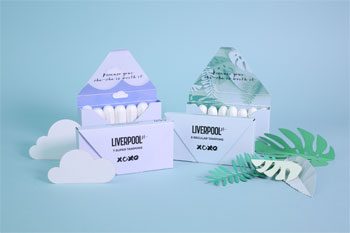Siobhan Komander Liverpool St Interview

Siobhan Komander Liverpool St Interview
Eating organic produce and using organic skincare is a priority to more than a quarter of Australians, however there is little awareness around the importance of using organic tampons each month.
A recent survey of 1,000 Australians, conducted by organic tampon delivery service Liverpool St, found that 34% of people believe that eating organic produce is important while 29% believe in using organic produce. Founder of Liverpool St Siobhan Komander says, 'Although many of us are opting for organic food and skin products, we're still reaching for the same tampons we always find in the supermarket aisles or at the chemist. From my experience in building the brand, it just doesn't occur to people to think about what's inside their tampons."
On average, women use between 8,000 and 11,000 tampons during their life and manufacturers are not obliged to list any ingredients on the packaging, as they are with shampoos and skincare products. 'We simply don't know what goes into the tampons we're using because there is no obligation from brands to tell us. How many women assume they're using cotton tampons purely because they're white?" says Siobhan.
Popular tampon brands admit their products consist of rayon, polyester and polyethylene which are all semi-synthetic or synthetic. The raw material polyethylene comes from is in fact crude oil. By heating up naphtha which is extracted from the oil, ethylene is released which is transformed into polyethylene in a factory. It is used in packaging, pipes, fuel tanks, garbage bags and, disturbingly, in tampons.
'While our mouths and stomachs are full of good enzymes which are in place to break down toxins and flush them out, our skin is extremely absorbent. The skin inside and around our vaginas is unbelievably delicate and can absorb chemicals found in synthetic tampons. Would you choose to insert phthalates, petroleum-based chemicals, parabens and aluminium salts in your vagina on a monthly basis?" says Siobhan.
An organic tampon is made from 100% raw cotton, meaning it is hypoallergenic and compatible with the body's pH levels. Organic tampons are also perfume and viscous free and there is no chlorine or dioxin used in the bleaching process. The earth also benefits from the use of organic tampons. Liverpool St tampons are between 97.5% biodegradable meaning they will decompose over time. Conventional tampons are made from synthetics that do not completely break down.
Siobhan herself was diagnosed with diabetes when she was 36 which led her to embrace a total overhaul of her life. She changed her diet, her exercise routine and her approach to healthy living. Then in 2015, her diabetes was spiralling out of control and her stress levels were sky high which led to a series of issues. 'This forced me to take a good, hard look at every product in my life. The more you read and learn the more concerning it becomes. I switched shampoos, body wash and skincare," says Siobhan. 'I realised I needed to make the switch for my tampons too – after all, they're not just going on my body but inside it. When I was searching for organic tampons online I found the process a challenge." This sparked an idea for a business – a natural and organic tampon delivery service that worked on a subscription model.
Liverpool St delivers organic tampons made from 100% cotton to women around Australia, including in rural areas, on a monthly basis. Liverpool St tampons are certified organic by ICEA under The Global Organic Textile Standard.
For more information, please visit www.liverpool.st.
A recent survey of 1,000 Australians, conducted by organic tampon delivery service Liverpool St, found that 34% of people believe that eating organic produce is important while 29% believe in using organic produce. Founder of Liverpool St Siobhan Komander says, 'Although many of us are opting for organic food and skin products, we're still reaching for the same tampons we always find in the supermarket aisles or at the chemist. From my experience in building the brand, it just doesn't occur to people to think about what's inside their tampons."
On average, women use between 8,000 and 11,000 tampons during their life and manufacturers are not obliged to list any ingredients on the packaging, as they are with shampoos and skincare products. 'We simply don't know what goes into the tampons we're using because there is no obligation from brands to tell us. How many women assume they're using cotton tampons purely because they're white?" says Siobhan.
Popular tampon brands admit their products consist of rayon, polyester and polyethylene which are all semi-synthetic or synthetic. The raw material polyethylene comes from is in fact crude oil. By heating up naphtha which is extracted from the oil, ethylene is released which is transformed into polyethylene in a factory. It is used in packaging, pipes, fuel tanks, garbage bags and, disturbingly, in tampons.
'While our mouths and stomachs are full of good enzymes which are in place to break down toxins and flush them out, our skin is extremely absorbent. The skin inside and around our vaginas is unbelievably delicate and can absorb chemicals found in synthetic tampons. Would you choose to insert phthalates, petroleum-based chemicals, parabens and aluminium salts in your vagina on a monthly basis?" says Siobhan.
An organic tampon is made from 100% raw cotton, meaning it is hypoallergenic and compatible with the body's pH levels. Organic tampons are also perfume and viscous free and there is no chlorine or dioxin used in the bleaching process. The earth also benefits from the use of organic tampons. Liverpool St tampons are between 97.5% biodegradable meaning they will decompose over time. Conventional tampons are made from synthetics that do not completely break down.
Siobhan herself was diagnosed with diabetes when she was 36 which led her to embrace a total overhaul of her life. She changed her diet, her exercise routine and her approach to healthy living. Then in 2015, her diabetes was spiralling out of control and her stress levels were sky high which led to a series of issues. 'This forced me to take a good, hard look at every product in my life. The more you read and learn the more concerning it becomes. I switched shampoos, body wash and skincare," says Siobhan. 'I realised I needed to make the switch for my tampons too – after all, they're not just going on my body but inside it. When I was searching for organic tampons online I found the process a challenge." This sparked an idea for a business – a natural and organic tampon delivery service that worked on a subscription model.
Liverpool St delivers organic tampons made from 100% cotton to women around Australia, including in rural areas, on a monthly basis. Liverpool St tampons are certified organic by ICEA under The Global Organic Textile Standard.
For more information, please visit www.liverpool.st.
Interview with Siobhan Komander, Founder of Liverpool St
Question: What are your thoughts on the fact, manufacturers are not obliged to list any ingredients on the packaging of tampons?
Siobhan Komander: Given how stringent we're becoming with food labelling, I don't see why it can't translate to feminine hygiene products – especially tampons as they are actually resting inside us. I think many women, (as I did for almost two decades) assume their tampons are cotton because their white. Let's put the ingredients on the pack!
Question: Can you talk about the importance of organic tampons?
Siobhan Komander: The reason I am passionate about organic products is that they are clean and unprocessed.
While our mouths and stomachs are full of good enzymes which are in place to break down toxins and flush them out, our skin is extremely absorbent. The skin inside and around our vaginas is unbelievably delicate and easily absorbs chemicals found in conventional tampons. Would you choose to sit down to a snack of phthalates, petroleum-based chemicals, parabens and aluminum salts for afternoon tea? No, but that's what you're putting in your delicate lady parts every month, year on year. Let's remember that, as women, we consume between 8,000 – 11,000 tampons in our life.
That's why Liverpool St is about organic. Because your cha-cha is worth it ladies.
Question: Why is it important to you, to consume and use organic products?
Siobhan Komander: My health really forced me to look at what I eat and consume. I'm ashamed to say it took a health crisis for me to really look at what I was doing to myself, but better late than not at all, they say!
It started with refined sugars and processed foods, just trying to limit those. I love fresh organic ingredients because they are grown naturally, however it's not always possible to get organic, so I try to focus on a fresh is best policy.
I believe in a life in moderation and balance and we can't always afford to buy organic or find it. If I can't, I try to at least go with the next best thing.
 Question: What inspired you to create Liverpool St?
Question: What inspired you to create Liverpool St?
Siobhan Komander: It was part of the cleansing process, I'd been looking constantly at sugar contents of products – boy they can be deceiving – and one day I checked my shampoo and then my skin cream and then my tampon box…which had no ingredients on it at all. I looked up the ingredients online and then one thing led to another. Being a busy business owner I'm always looking for convenience, so I thought why not combine the two – a good clean product for women and a delivery service…..which then grew into a community for women! Crazy, I know, but these things just gain a momentum of their own don't they? And I'm loving every single minute of it.
Question: What is an organic tampon made from?
Siobhan Komander: Ah, this is the best part. 100% raw organic cotton. Because of this, they are hypoallergenic, breathable and absolutely compatible with the body's pH level, therefore keeping the vaginal ecosystem healthy and happy.
Liverpool St tampons are made from raw cotton and certified organic by ICEA under the global GOTS Standard. They are proudly bleach free and are washed with environmentally friendly, chemical-free products. Organic tampons, by nature of their -organic-ness', won't be consistent in colour and aren't the brilliant white of conventional tampons.
Question: And what ingredients might we find in a non-organic tampons?
Siobhan Komander: Yes, now to the not so good part. Most conventional tampons are made with synthetic, man-made ingredients. It's cheaper and quicker to get from the point of manufacture into consumers hands.
Popular tampon brands admit their products consist of rayon, polyester and polyethylene which are all semi-synthetic or synthetic. The raw material polyethylene comes from is in fact crude oil. By heating up naphtha which is extracted from the oil, ethylene is released which is transformed into polyethylene in a factory. It is used in packaging, pipes, fuel tanks, garbage bags and, disturbingly, in tampons.
Question: Can you talk us through the tampon subscription delivery service?
Siobhan Komander: Interestingly our research indicated that 63% of women forget to buy their tampons and found themselves scrambling around their office drawer or handbag looking for a tampon. It's just not something we like to think about, let's face it, so at Liverpoolst.com.au we are combining good stuff for your cha-cha with the convenience of monthly delivery. It can also be challenging for women in regional areas to get their hands on organic tampons, so we really want to support those women by delivering straight to them.
We'll be expanding our product range into other organic feminine hygiene products in the not too distant future!
Question: How does the earth benefit from organic tampons?
Siobhan Komander: In so many ways. Here's three.
Liverpool St tampons are 97.5% biodegradable whereas conventional tampons, made from synthetic materials, just can't claim such high biodegradability.
The chemicals in the bleaching process are frankly nasty, and the impact on planet earth in their processing and use is toxic.
Finally all those manufacturing facilities and the energy they consume to make the plastics and materials that go into conventional tampons have an enormous carbon footprint.
So let's stick to raw cotton ladies, it's better for you and the world around us! Liverpoolst.com.au
Interview by Brooke Hunter
Siobhan Komander: Given how stringent we're becoming with food labelling, I don't see why it can't translate to feminine hygiene products – especially tampons as they are actually resting inside us. I think many women, (as I did for almost two decades) assume their tampons are cotton because their white. Let's put the ingredients on the pack!
Question: Can you talk about the importance of organic tampons?
Siobhan Komander: The reason I am passionate about organic products is that they are clean and unprocessed.
While our mouths and stomachs are full of good enzymes which are in place to break down toxins and flush them out, our skin is extremely absorbent. The skin inside and around our vaginas is unbelievably delicate and easily absorbs chemicals found in conventional tampons. Would you choose to sit down to a snack of phthalates, petroleum-based chemicals, parabens and aluminum salts for afternoon tea? No, but that's what you're putting in your delicate lady parts every month, year on year. Let's remember that, as women, we consume between 8,000 – 11,000 tampons in our life.
That's why Liverpool St is about organic. Because your cha-cha is worth it ladies.
Question: Why is it important to you, to consume and use organic products?
Siobhan Komander: My health really forced me to look at what I eat and consume. I'm ashamed to say it took a health crisis for me to really look at what I was doing to myself, but better late than not at all, they say!
It started with refined sugars and processed foods, just trying to limit those. I love fresh organic ingredients because they are grown naturally, however it's not always possible to get organic, so I try to focus on a fresh is best policy.
I believe in a life in moderation and balance and we can't always afford to buy organic or find it. If I can't, I try to at least go with the next best thing.
 Question: What inspired you to create Liverpool St?
Question: What inspired you to create Liverpool St? Siobhan Komander: It was part of the cleansing process, I'd been looking constantly at sugar contents of products – boy they can be deceiving – and one day I checked my shampoo and then my skin cream and then my tampon box…which had no ingredients on it at all. I looked up the ingredients online and then one thing led to another. Being a busy business owner I'm always looking for convenience, so I thought why not combine the two – a good clean product for women and a delivery service…..which then grew into a community for women! Crazy, I know, but these things just gain a momentum of their own don't they? And I'm loving every single minute of it.
Question: What is an organic tampon made from?
Siobhan Komander: Ah, this is the best part. 100% raw organic cotton. Because of this, they are hypoallergenic, breathable and absolutely compatible with the body's pH level, therefore keeping the vaginal ecosystem healthy and happy.
Liverpool St tampons are made from raw cotton and certified organic by ICEA under the global GOTS Standard. They are proudly bleach free and are washed with environmentally friendly, chemical-free products. Organic tampons, by nature of their -organic-ness', won't be consistent in colour and aren't the brilliant white of conventional tampons.
Question: And what ingredients might we find in a non-organic tampons?
Siobhan Komander: Yes, now to the not so good part. Most conventional tampons are made with synthetic, man-made ingredients. It's cheaper and quicker to get from the point of manufacture into consumers hands.
Popular tampon brands admit their products consist of rayon, polyester and polyethylene which are all semi-synthetic or synthetic. The raw material polyethylene comes from is in fact crude oil. By heating up naphtha which is extracted from the oil, ethylene is released which is transformed into polyethylene in a factory. It is used in packaging, pipes, fuel tanks, garbage bags and, disturbingly, in tampons.
Question: Can you talk us through the tampon subscription delivery service?
Siobhan Komander: Interestingly our research indicated that 63% of women forget to buy their tampons and found themselves scrambling around their office drawer or handbag looking for a tampon. It's just not something we like to think about, let's face it, so at Liverpoolst.com.au we are combining good stuff for your cha-cha with the convenience of monthly delivery. It can also be challenging for women in regional areas to get their hands on organic tampons, so we really want to support those women by delivering straight to them.
We'll be expanding our product range into other organic feminine hygiene products in the not too distant future!
Question: How does the earth benefit from organic tampons?
Siobhan Komander: In so many ways. Here's three.
Liverpool St tampons are 97.5% biodegradable whereas conventional tampons, made from synthetic materials, just can't claim such high biodegradability.
The chemicals in the bleaching process are frankly nasty, and the impact on planet earth in their processing and use is toxic.
Finally all those manufacturing facilities and the energy they consume to make the plastics and materials that go into conventional tampons have an enormous carbon footprint.
So let's stick to raw cotton ladies, it's better for you and the world around us! Liverpoolst.com.au
Interview by Brooke Hunter
MORE





